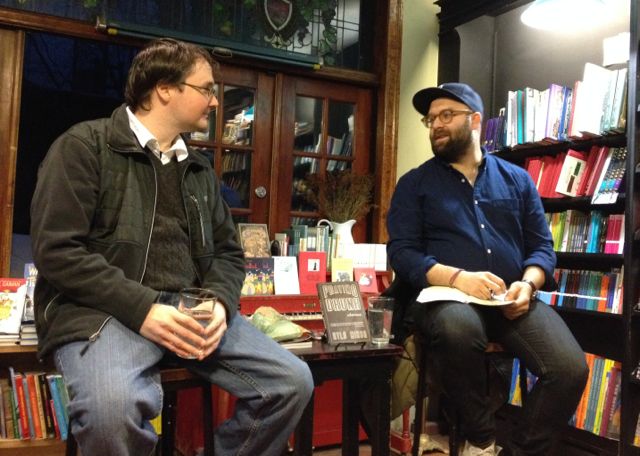
Community Bookstore hosted a discussion between Kyle Minor and Vol 1 Brooklyn editor Jason Diamond. Minor’s story collection Praying Drunk (January 2014) has been more than a decade in the making and includes a novella. Diamond asked him about that and his future projects.
Praying Drunk is something of a salvage operation, Minor explains. Many of the stories began as essays, some were pieces of failed books. Minor refused to discard tthis writing though. He says he mimicked his friend and fellow author Matt Bell. For his book Cataclysm Baby (2012), Bell collected the pieces of writing he had and laid them out on the floor to let them, as Minor describes, converse. Minor did the same. He collected the pieces that eventually became Praying Drunk and spread them out. “I saw a map of all my sadness,” he says.
A natural storyteller, Minor begins to explain that in putting the book together, he thought about the traveling ministers he encountered as a child. They spoke of the second coming and warned against sin. They would talk about Gremlins clawing at his arms and warned that a red sky at night would lead to Christ’s returning on a horse. They showed him movies that always ended with young girls running away–
Diamond interjects saying that as a Jew, he was taught that the arrival of the Messiah would mean everyone was able to spend all their time studying the torah.
Eventually the girl running away would end up caught and her neck placed in a guillotine. In the film that the traveling ministers showed to children, the guillotine falls. The camera cuts away and the girl is heard screaming for another minute. At this point, Minor explains, the metaphor begins. The sheep and the goats are separated. Sheep go to heaven, and goats go to hell, he says, just like the Cake song. He thought this sounded terrible because he didn’t like any of these people.
A lot of the characters in Praying Drunk involve Jesus, Diamond points out. He asks whether the book was like an exorcism of this Christianity for Minor.
Humbly, Minor says that he wasn’t good enough to write a work that was outside of his preoccupations. “I was stuck with what I had.” He needed to focus on the kinds of issues close at hand because he still needed to grow as writer. He adds that he came from a place with zero literary tradition.
Fundamentalist Christianity, Minor says, is about reduction of complex issues into a simple prepackaged answer. Literature is the opposite of that. It complicates questions in the hopes of achieving a greater truth.
Diamond shifts the conversation toward social media. He mentions Matt Bell again, and points to the how social media has been important to both Bell and Minor.
When Minor was in graduate school for the first time, the internet was less important. Then, he explains, the voices that mattered most to him were those of his teachers. But his teachers were of a different generation and thus limited. Minor sees literature as a much broader type of thing and the internet is crucial to that experience.
It seemed to Minor that New York City was the center of the world, and yet he didn’t necessarily have access to that cultural center. The internet and social media allowed access, it allowed him to build a readership.
“The writers outside of New York are the most fascinating,” Diamond offers. Next, he asks Minor about the warning inside the book instructing readers to read without skipping around.
The book’s shape came from an organic process, Minor says. Its more than a collection. As a book, it has structure. The book has been designed to reveal its secrets over the course reading through it, he says.
Diamond jokes that when he went back to read the book a second time in order to prepare for the night’s questions, he “totally skipped around.” He then asks about the differences Minor sees between Praying Drunk and his previous book, In The Devil’s Territory (2008).
The oldest stories in Praying Drunk are from as early as 2004, Minor says. However, Minor describes it as though ” a middle-aged man wrote it.” It was about pleasing certain teachers when he wrote that early story. “I had a wrong idea of literature,” he says. Writers begin with a certain idea of what literature is, Minor adds. They then need to seek freedom from that idea.
Minor is currently working on a novel set in Haiti. He first started traveling to Haiti when a director asked him to write a screenplay adaptation of another work. As a result, Minor read up on Haiti. He seems fascinated by the subject, the historic link to the United States and slavery, and the precedence of the nation as one created by a slave rebellion. Eventually, he says, the director revealed the failure to secure the screen options. The project fell through, but Minor was still enchanted. He began traveling to the country regularly. The people he met confided stories in him. Ultimately, he says, writing a novel about Haiti is simultaneously writing a novel about the United States.
When it comes to his next projects, Minor says he wants to focus on more public concerns. “I want to take the things I learned scraping out my insides,” he says, and scrape out the insides of everyone else.
Minor’s focus is on the genuine and the authentic. He condemns the idea of contemporary “hipster” literature’s nonchalance and ironic point of view. He says this distances people from the material and that he is only really interested in reading books that believe in themselves. Writing needs to believe in itself as tackling the most important thing.
“Its not particularly noble what writers do,” he says. He adds, “your primary mission is to appropriate.”